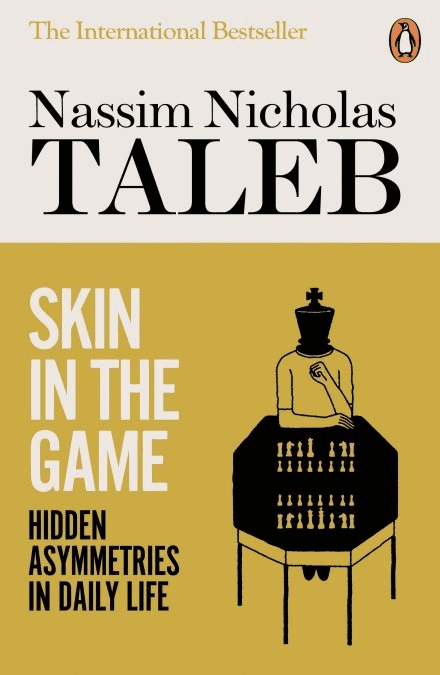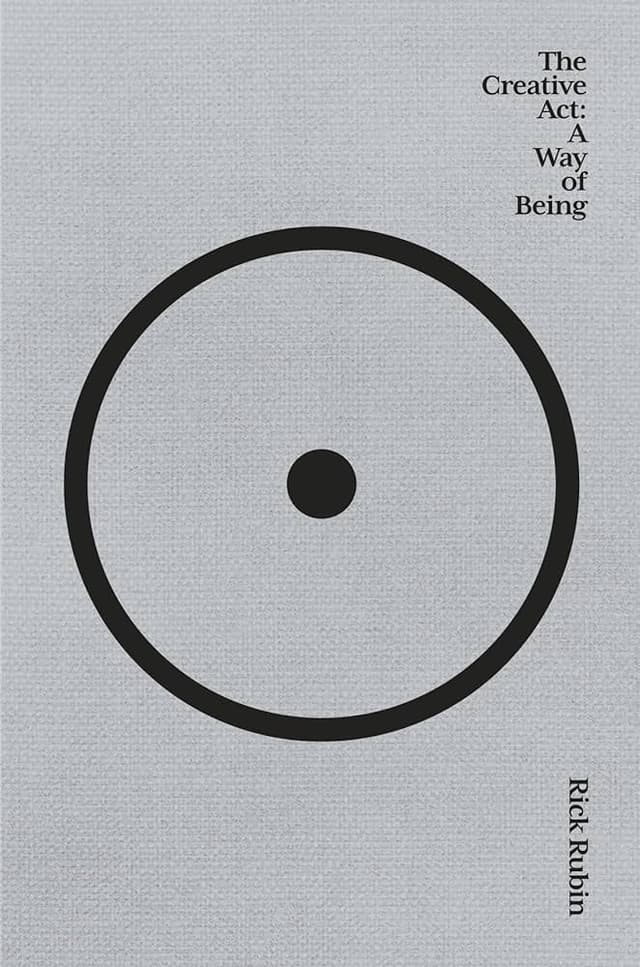The Creative Act vs. Skin in the Game: Hidden Asymmetries in Daily Life
The Creative Act
“I set out to write a book about what to do to make a great work of art. Instead, it revealed itself to be a book on how to be.” —Rick Rubin
Skin in the Game: Hidden Asymmetries in Daily Life
Skin in the Game: Hidden Asymmetries in Daily Life is a nonfiction book by Nassim Nicholas Taleb, published in 2018. Taleb’s main point is pretty simple: people should share in the risks of the decisions they make. If you benefit from something, you should also face the downsides if things go wrong. He calls this having “skin in the game.” Without that, people can make reckless choices that hurt others while staying safe themselves. The book covers everything from politics and business to religion and everyday life. Taleb doesn’t hold back on criticism. He talks about how some policymakers and financial experts make decisions that affect millions but don’t suffer when those decisions backfire. He uses examples like bankers profiting during booms but getting bailed out during crashes. Taleb also goes after what he calls “Intellectual Yet Idiot” types—educated people who, in his view, complicate things and give advice without understanding real-world consequences. He argues that real k...

Reviews
Reviews
| Item | Votes | Upvote |
|---|---|---|
| No pros yet, would you like to add one? | ||
| Item | Votes | Upvote |
|---|---|---|
| No cons yet, would you like to add one? | ||
| Item | Votes | Upvote |
|---|---|---|
| Insightful and provocative arguments | 1 | |
| Applies to various aspects of life | 1 | |
| Engaging and accessible writing style | 1 | |
| A sensible approach to ethics | 1 |
| Item | Votes | Upvote |
|---|---|---|
| Some arguments can be repetitive | 1 | |
| Taleb's confrontational tone may not appeal to everyone | 1 |
Frequently Asked Questions
'The Creative Act' by Rick Rubin centers on the process of creating art and personal expression, emphasizing how to be rather than just what to do. In contrast, 'Skin in the Game' by Nassim Nicholas Taleb discusses the importance of personal risk in decision-making and ethics. While both books offer valuable insights, 'The Creative Act' is more about the artistic journey, whereas 'Skin in the Game' focuses on accountability and fairness in various life aspects.
'Skin in the Game' provides a philosophical exploration of ethics, decision-making, and personal risk, making it rich in philosophical content. 'The Creative Act', while it touches on deeper themes of being and creativity, is more focused on the practical aspects of artistic creation. Therefore, if you're looking for a book with a strong philosophical perspective, 'Skin in the Game' would be the better choice.
'Skin in the Game' offers practical applications of its concepts in everyday decision-making and ethics, emphasizing the importance of having a personal stake in outcomes. In contrast, 'The Creative Act' is more about the internal process of creativity and self-discovery, which may not have as direct practical applications in daily life. Thus, for practical insights, 'Skin in the Game' is likely more beneficial.
'The Creative Act' by Rick Rubin is a book that explores the essence of creativity and being. Initially intended to be a guide on how to create great works of art, it evolved into a broader examination of how to live a creative life. The book delves into the philosophical aspects of creativity, providing insights and reflections on how to harness one's inner creative potential.
Rick Rubin is a renowned music producer and co-founder of Def Jam Recordings. He has worked with a wide array of artists across various genres, including Johnny Cash, Beastie Boys, and Red Hot Chili Peppers. Known for his minimalist production style and profound influence on the music industry, Rubin has also ventured into writing, with 'The Creative Act' being one of his notable works.
'The Creative Act' touches on several key themes, including the nature of creativity, the importance of mindfulness, and the process of artistic expression. Rick Rubin emphasizes the significance of being present and open to inspiration, as well as the value of persistence and authenticity in the creative journey.
As of now, there are no user-generated pros and cons for 'The Creative Act'. However, readers may appreciate its deep philosophical insights and practical advice on creativity. Some may find its abstract nature challenging, depending on their expectations and familiarity with Rubin's style.
'Skin in the Game: Hidden Asymmetries in Daily Life' is a nonfiction book by Nassim Nicholas Taleb that argues people should share in the risks of their decisions. Taleb emphasizes that if someone benefits from a decision, they should also face the potential downsides. The book critiques various sectors, including politics and finance, highlighting how decision-makers often escape the consequences of their actions. It explores themes of accountability and the importance of real-world experience over theoretical knowledge.
Nassim Nicholas Taleb is a Lebanese-American essayist, scholar, and statistician known for his work on risk, uncertainty, and decision-making. He is the author of several influential books, including 'The Black Swan' and 'Antifragile.' Taleb's writing often critiques conventional wisdom and emphasizes the importance of practical experience in understanding complex systems.
Pros of 'Skin in the Game' include its insightful and provocative arguments, applicability to various aspects of life, engaging writing style, and a sensible approach to ethics. However, some cons are that certain arguments can be repetitive, and Taleb's confrontational tone may not appeal to everyone.
The main themes of 'Skin in the Game' include accountability, the importance of sharing risks in decision-making, the critique of policymakers and financial experts who evade consequences, and the influence of stubborn minorities on societal choices. Taleb also discusses the concept of real knowledge being derived from practical experience rather than theoretical understanding.
Nassim Nicholas Taleb's writing style in 'Skin in the Game' is direct and sometimes blunt. He is known for his no-nonsense approach, which some readers appreciate for its clarity and honesty, while others may find it overly combative or confrontational.




















